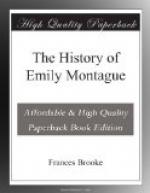Sweet home! only seat of true and genuine happiness.
I am extremely in the humor to write a poem to the houshold gods.
We neglect these amiable deities, but they are revenged; true pleasure is only to be found under their auspices.
I know not how it is, my dear Fitzgerald; but I don’t find my passion for the country abate.
I still find the scenes around me lovely; though, from the change of season, less smiling than when I first fixed at Bellfield; we have rural business enough to amuse, not embarrass us; we have a small but excellent library of books, given us by my mother; she and Emily are two of the most pleasing companions on earth; the neighbourhood is full of agreable people, and, what should always be attended to in fixing in the country, of fortunes not superior to our own.
The evenings grow long, but they are only the more jovial; I love the pleasures of the table, not for their own sakes, for no man is more indifferent on this subject; but because they promote social, convivial joy, and bring people together in good humor with themselves and each other.
My Emily’s suppers are enchanting; but our little income obliges us to have few: if I was rich, this would be my principal extravagance.
To fill up my measure of content, Emily is pleased with my retirement, and finds all her happiness in my affection.
We are so little alone, that I find our moments of unreserved conversation too short; whenever I leave her, I recollect a thousand things I had to say, a thousand new ideas to communicate, and am impatient for the hour of seeing again, without restraint, the most amiable and pleasing of woman-kind.
My happiness would be complete, if I did not sometimes see a cloud of anxiety on that dear countenance, which, however, is dissipated the moment my eyes meet hers.
I am going to Temple’s, and the chaise is at the door.
Adieu! my dear friend!
Your affectionate
Ed.
Rivers.
LETTER 216.
To Colonel Rivers.
Nov. 14.
So you disapprove male friendships, my sweet Colonel! I thought you had better ideas of things in general.
Fitzgerald and I have been disputing on French and English manners, in regard to gallantry.
The great question is, Whether a man is more hurt by the imprudent conduct of his daughter or his wife?
Much may be said on both sides.
There is some hazard in suffering coquetry in either; both contribute to give charms to conversation, and introduce ease and politeness into society; but both are dangerous to manners.
Our customs, however, are most likely to produce good effects, as they give opportunity for love marriages, the only ones which can make worthy minds happy.
The coquetry of single women has a point of view consistent with honor; that of married women has generally no point of view at all; it is, however of use pour passer le tems.




